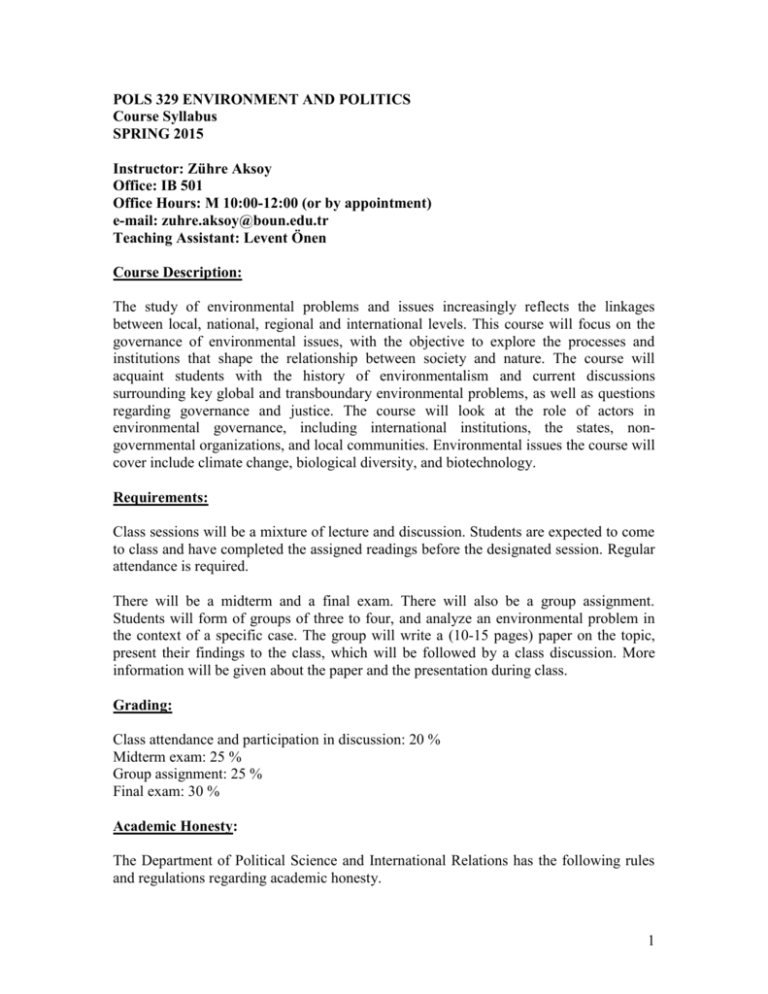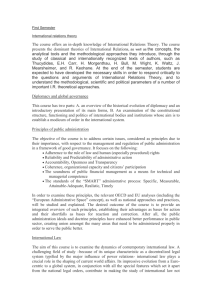329Sp15 - Department of Political Science and International
advertisement

POLS 329 ENVIRONMENT AND POLITICS Course Syllabus SPRING 2015 Instructor: Zühre Aksoy Office: IB 501 Office Hours: M 10:00-12:00 (or by appointment) e-mail: zuhre.aksoy@boun.edu.tr Teaching Assistant: Levent Önen Course Description: The study of environmental problems and issues increasingly reflects the linkages between local, national, regional and international levels. This course will focus on the governance of environmental issues, with the objective to explore the processes and institutions that shape the relationship between society and nature. The course will acquaint students with the history of environmentalism and current discussions surrounding key global and transboundary environmental problems, as well as questions regarding governance and justice. The course will look at the role of actors in environmental governance, including international institutions, the states, nongovernmental organizations, and local communities. Environmental issues the course will cover include climate change, biological diversity, and biotechnology. Requirements: Class sessions will be a mixture of lecture and discussion. Students are expected to come to class and have completed the assigned readings before the designated session. Regular attendance is required. There will be a midterm and a final exam. There will also be a group assignment. Students will form of groups of three to four, and analyze an environmental problem in the context of a specific case. The group will write a (10-15 pages) paper on the topic, present their findings to the class, which will be followed by a class discussion. More information will be given about the paper and the presentation during class. Grading: Class attendance and participation in discussion: 20 % Midterm exam: 25 % Group assignment: 25 % Final exam: 30 % Academic Honesty: The Department of Political Science and International Relations has the following rules and regulations regarding academic honesty. 1 1. Copying work from others or giving and receiving answers/information during exams either in written or oral form constitutes cheating. 2. Submitting take-home exams and papers of others as your own, using sentences or paragraphs from another author without the proper acknowledgement of the original author, insufficient acknowledgement of the consulted works in the bibliography, all constitute plagiarism. For further guidelines, you can consult http://web.gc.cuny.edu/provost/pdf/AvoidingPlagiarism.pdf 3. Plagiarism and cheating are serious offenses and will result in: a) an automatic “F” in the assignment or the exam b) an oral explanation before the Departmental Ethics Committee c) losing the opportunity to request and receive any references from the entire faculty d) losing the opportunity to apply in exchange programs e) losing the prospects of becoming a student assistant or a graduate assistant in the department The students may further be sent to the University Ethics committee or be subject to disciplinary action. READING LIST: February 9, 10: Introduction Amartya Sen 2004. Why We Should Preserve the Spotted Owl. London Review of Books. 26, 3. UNEP 2012. Global Environment Outlook 5: Environment for the Future We Want. Available at: http://www.unep.org/geo/ February 16, 17: Environment and Politics Ramachandra Guha. 2000. Environmentalism: A Global History. pp. 69-97. Arun Agrawal and Maria Carmen Lemos. 2007. A Greener Revolution in the Making: Environmental Governance in the 21st Century. Environment, Vol.49, No.5, pp.36-45. Maria Ivanova. 2013. The Contested Legacy of Rio+20. Global Environmental Politics. 13, 4. pp.1-11. February 23, 24: Green Parties, Democracy and Ecology John McCormick. 1995. The Arrival of the Greens (1972-1990). In The Global Environmental Movement (John Wiley and Sons). pp. 203-224. Neil Carter. 2013. Greening the Mainstream: Party Politics and the Environment. Environmental Politics, 22 (1): 73-94. Robyn Eckersley. 2004. Chapter 5: From Liberal to Ecological Democracy. In The Green State: Rethinking Democracy and Sovereignty. (MIT Press). 2 March 2, 3: The Commons and Environmental Problems Hardin, Garret. 1968. The Tragedy of the Commons. Science, 162, pp.1243-1248. David Feeny, Fikret Berkes, Bonnie J. McCay, and James Acheson. 1998. The Tragedy of the Commons: Twenty-Two Years Later. In Green Planet Blues, edited by Ken Conca and Geoffrey Dabelko, (Westview Press). Elinor Ostrom, Joanna Burger, Christopher B. Field, Richard B. Norgaard and David Policansky. Revisiting the Commons: Local Lessons, Global Challenges. Science 284.5412 (April 9, 1999). March 9, 10: Film Screening March 9: Film Screening March 10: Groups will be formed and topics determined. March 16, 17: Biological Diversity Convention on Biological Diversity (CBD) website: www.cbd.int Cardinale et al. 2012. Biodiversity loss and its impact on humanity. Nature 486, 59-67. G. Kristin Rosendal. 2011. Biodiversity Protection in International Negotiations: Cooperation and Conflict. In Shlomi Dinar (ed.) Beyond Resource Wars: Scarcity, Environmental Degradation and International Cooperation. (The MIT Press). Zuhre Aksoy. 2014. Local-Global Linkages in Environmental Governance: The Case of Crop Genetic Resources. Global Environmental Politics. 14 (2): 26-44. March 23, 24: Global Climate Change United Nations Framework Convention on Climate Change (UNFCCC) website: www.unfccc.int Joyeeta Gupta. 2010. A History of International Climate Change Policy. Wiley Interdisciplinary Reviews: Climate Change, 1, 5, pp. 636-653. Geck et al 2013. Breaking the Impasse: Towards a New Regime for International Climate Governance. Climate Policy. 13 (6): 777-784. Paul Wapner. 2014. Climate Suffering. Global Environmental Politics. 14 (2): 1-6. Group assignment paper outlines due in class on March 23, Monday. March 30: MONDAY: MIDTERM EXAM (In class) April 6, 7: Agriculture, Environment, and the Politics of Biotechnology Marc Williams. 2011. Agriculture and the Environment. In Gabriela Kütting (ed) Global Environmental Politics: Concept, Theories and Case Studies. Routledge. V. Shiva. 2001. Biopiracy: The Theft of Knowledge and Resources’, in Brian Tokar (ed.) Redesigning Life: The Worldwide Challenge to Genetic Engineering, (London: Zed Books, distributed by Palgrave in the US), Chapter 20. Robert Falkner and Aarti Gupta. 2009. Limits of Regulatory Convergence: Globalization and GMO Politics in the South. International Environmental Agreements, 9, pp.113-133. 3 April 13, 14: Science and Traditional Knowledge in Environmental Politics Peter M. Haas. 1992. Introduction: Epistemic Communities and International Policy Coordination. International Organization. 46, 1, pp. 1-35. Fikret Berkes. 2008. Context of Traditional Ecological Knowledge. In Sacred Ecology, pp. 1-20. Drahos, P. 2011. When Cosmology Meets Property: Indigenous Peoples’ Innovation and Intellectual Property. Prometheus, 29, 3, pp.233-252. Group assignment presentations (I) April 20, 21: SPRING BREAK: NO CLASS April 27, 28: Environment and Justice David Harvey. 1996. Justice, Nature and the Geography of Difference. Blackwell Publishers. pp. 366-402. Krista Harper and Ravi Rajan. 2007. International Environmental Justice: Building the Natural Assets of the World’s Poor. In Boyce, Narain and Stanton (eds.), Reclaiming Nature: Environmental Justice and Ecological Restoration, (Anthem Press), pp. 327-348. Schlosberg, D. 2013. Theorising environmental justice: the expanding sphere of a discourse. Environmental Politics, 22(1), 37-55. Group assignment presentations (II) May 4, 5: Environmental Politics and Governance: Overview James K. Boyce. 2004. Green and Brown? Globalization and the Environment. Oxford Review of Economic Policy, Vol 20, No.1, pp.105-128. Biermann et al 2012. Navigating the Anthropocene: Improving Earth System Governance. Science. 335. pp. 1306-1307. Biermann, F. 2012. Greening the United Nations Charter: World Politics in the Anthropocene. Environment, 54 (3): 6-17. Falkner, Robert (2012) 'Global Environmentalism and the Greening of International Society', International Affairs vol. 88, no. 3, pp. 503-22. Group assignment presentations (III) May 11: Group assignment Papers are due+ Film Screening 4








